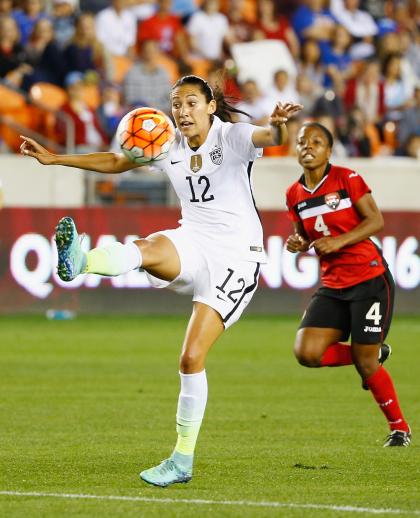The one USWNT issue that could become urgent in SheBelieves Cup

Let's talk about that godawful title first. The SheBelieves Cup is a terrible name for a tournament. As is the #shebelieves Cup. Sure, U.S. Soccer needed a name for its newfangled event, which kicks off on Thursday and was designed as a practical and competitive substitute for the Algarve Cup, the annual tournament in Portugal that more or less kicked off the international women's soccer year. But still – yuck.
[ SheBelieves Cup Live: Follow United States vs. England as it happens ]
Perhaps reverting to a rallying cry and hashtag from last summer's run to a third Women's World Cup title made a certain amount of marketing sense, but it doesn't exactly roll off the tongue.
What we call it is ultimately inconsequential, though. And once you've gotten over the SBC's name – let's just agree to call it by its acronym as a compromise – what matters far more is how it prepares the United States women's national team for 2016. How well it serves as a rehearsal in its complicated campaign for a fourth straight Olympic gold medal in Rio de Janeiro this summer – a feat that would ensure a fifth gold medal overall and a spot in every single final of a women's soccer tournament played at the Summer Games.
This is a strange time for the U.S. Lately, its program has soared under the steady hand of Jill Ellis. The 16-year World Cup drought was finally ended. Last month's Olympic qualifying tournament was mostly a doddle. And yes, there have been on-field issues like the playing surfaces and off-field ones such as the lawsuit between the players union and the federation over the validity of their interim collective bargaining agreement. But on the whole, things are going very well.
Except that this peak period is also kind of a rebuilding year. That's unusual in women's soccer. World Cups and the Olympics happen in back-to-back summers, and then there's no competition of real consequence for almost three years. So you build your team for that two-summer push and then you make changes where necessary.
But Ellis really hasn't had a choice in the matter. On the one hand, she hadn't yet had a chance to really mold the team in her vision – a wide, high-pressure, up-tempo, ball-hogging style – since she took over from the fired Tom Sermanni just a year before the World Cup and only really had time to get the train back on the rails. On the other, a series of retirements, injuries and pregnancies have forced further changes.
After that twirly World Cup statuette – it kind of looks like a big Frito with a ball in it – was finally secured again, several key players retired. Abby Wambach, Lauren Holiday, Shannon Boxx and Lori Chalupny all waved off in a matter of months. So did Rachel Van Hollebeke, who hadn't made the World Cup team. Then strikers Sidney Leroux and Amy Rodriguez got pregnant, meaning they will miss the Olympics. Playmaker Megan Rapinoe tore her ACL during a December practice on a bad field and is out for the year as well.
Rejuvenation was already overdue. Of the core players remaining, Hope Solo, Becky Sauerbrunn, Ali Krieger, Heather O'Reilly and Carli Lloyd will all be 31 or older by the time the Olympics start. Of the most recent generation to make its mark, Julie Johnston, Morgan Brian, Lindsey Horan and Crystal Dunn are all 23 or younger – and none have more than 48 caps, making them relatively inexperienced on the busy women's team.

Stuck in the middle are Meghan Klingenberg, Kelley O'Hara, Tobin Heath and Christen Press, all of whom are 27. But Klingenberg only became a starter last year and the other three have been in and out of the side for as long as they've been on the national team. Then there's Alex Morgan, 26, who has missed much of the last two years with injuries.
Of those out for the year, Rapinoe is 30, Rodriguez 29 and Leroux 25. But Leroux has fallen off steeply since her first few years as she's struggled to source any consistency or very many minutes.
There's a generational gap of sorts on the national team. As the older generation slowly thins out and fades and the younger one finds its feet, the middle generation that should be taking the reins hasn't quite done so yet, even though it certainly doesn't lack for talent. This is nitpicky stuff, to be sure, and the mid- to late-20-somethings may very well step up now that bigger roles have opened up for them. Nor is it a particularly urgent issue yet, but it could become one.
All of this bears watching in the SBC. Because the Americans will actually face much stronger opposition than they did in Olympic qualifying, when only Mexico and Canada gave them real games. England, Germany and France have been lined up for the games on March 3, 6 and 9 in Florida and Tennessee. The former two were World Cup semifinalists last year. France was good enough to play in the semis but fell to the Germans on penalties in the quarterfinals.
These are strong and deep and experienced teams. And we'll get a much better sense of where this USA team really stands. And whether or not – *sigh* – we can believe in it this summer or not.
Leander Schaerlaeckens is a soccer columnist for Yahoo Sports. Follow him on Twitter @LeanderAlphabet.



